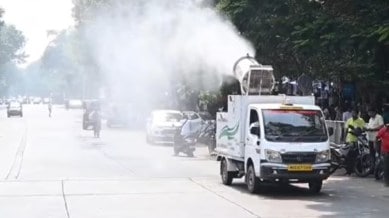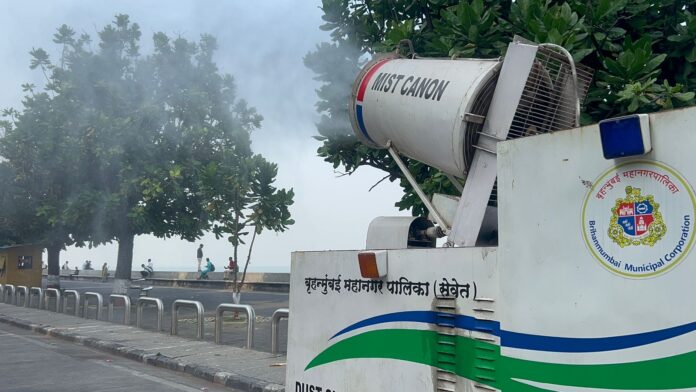BMC Dust Mitigation Fines: The Brihanmumbai Municipal Corporation (BMC) has taken strict action against violators of dust mitigation norms, collecting ₹56,700 in fines within just 24 hours. This initiative is part of the civic body’s ongoing efforts to combat air pollution and enforce compliance with solid waste management (SWM) rules.
Mumbai’s air quality index (AQI) remained a cause for concern on Wednesday, with a citywide average reading of 191, categorized as “moderate.” However, several areas, including Borivali and Colaba, recorded “poor” air quality, highlighting the urgent need for stronger dust control measures.
Areas With Poor Air Quality In Mumbai
While Mumbai’s overall AQI stood at 191, pockets of the city continued to grapple with alarming air quality levels:
- Borivali: Worst-hit with an AQI of 304.
- Colaba: Recorded an AQI of 300.
- Mazgaon: Reported an AQI of 286.
- Malad: Registered an AQI of 265.
- Deonar: Noted an AQI of 243.
- Sewri: Recorded an AQI of 217.
The data from the Central Pollution Control Board (CPCB) portal highlights the uneven distribution of pollution across Mumbai, necessitating localized and targeted mitigation measures.

BMC’s Penalty Framework
The BMC imposes fines under its solid waste management (SWM) rules to ensure civic compliance. Here’s a breakdown of the penalties:
- Littering And Spitting:
- ₹200 fine for individuals caught littering or spitting.
- Pet Waste:
- ₹500 fine for littering of pets in public spaces.
- Serious Violations:
- ₹1,000 fine for washing vehicles, defecating in public spaces, debris dumping, or improper waste disposal.
- Burning Garbage:
- ₹100 fine for burning garbage.
These fines aim to deter irresponsible behavior and reduce dust and waste accumulation in public spaces.
BMC’s Dust Mitigation Efforts
To combat rising pollution levels, the BMC has issued new guidelines emphasizing road cleanliness and dust control:
- Mechanical Sweepers:
- The civic body is deploying extensive mechanical sweeping machines for efficient cleaning of roads.
- Water Sprinkling:
- Roads will be sprinkled with water daily to prevent dust displacement caused by vehicle movement and wind.
- Monitoring And Enforcement:
- Teams are actively monitoring compliance and imposing fines on violators to ensure adherence to guidelines.
Impact Of Dust Mitigation On Mumbai’s AQI
Mumbai’s AQI readings highlight the importance of dust mitigation measures. Air quality has a direct impact on public health, particularly for individuals with respiratory ailments. Areas like Borivali and Colaba, which recorded AQI levels above 300, fall under the “poor” category, posing significant risks to residents.
The BMC’s intensified efforts, including mechanical sweeping and water sprinkling, aim to curb particulate matter and improve air quality across the city.
Role Of Public Awareness And Compliance
While the BMC’s initiatives are commendable, addressing air pollution requires collective efforts. Public compliance with civic rules plays a crucial role in ensuring the success of dust mitigation strategies. Residents are encouraged to:
- Avoid burning waste.
- Dispose of garbage responsibly.
- Refrain from littering or washing vehicles in public spaces.
Raising awareness about the consequences of air pollution and promoting sustainable practices can significantly contribute to long-term improvements in Mumbai’s air quality.
Broader Implications For Urban Pollution Control
Mumbai’s struggle with air pollution is reflective of challenges faced by urban centers worldwide. The integration of technology, such as mechanical sweepers, and strict enforcement of civic rules, sets a precedent for other cities to follow.
Key takeaways from the BMC’s efforts include:
- Localized Solutions:
- Identifying high-pollution zones and implementing targeted measures.
- Public-Private Collaboration:
- Encouraging partnerships between civic authorities and private stakeholders for effective pollution control.
- Policy Implementation:
- Ensuring stricter compliance with environmental regulations to sustain long-term benefits.
Way Forward For Mumbai’s Air Quality
The BMC’s proactive approach to dust mitigation and pollution control is a step in the right direction. However, sustained efforts are needed to ensure lasting improvements. Enhancing public participation, expanding monitoring mechanisms, and investing in sustainable infrastructure are key to achieving cleaner air for Mumbai’s residents.
With focused initiatives and community support, Mumbai can pave the way for a healthier and more sustainable urban environment. The fines collected and guidelines implemented serve as a reminder that tackling pollution is a shared responsibility that requires consistent action.

